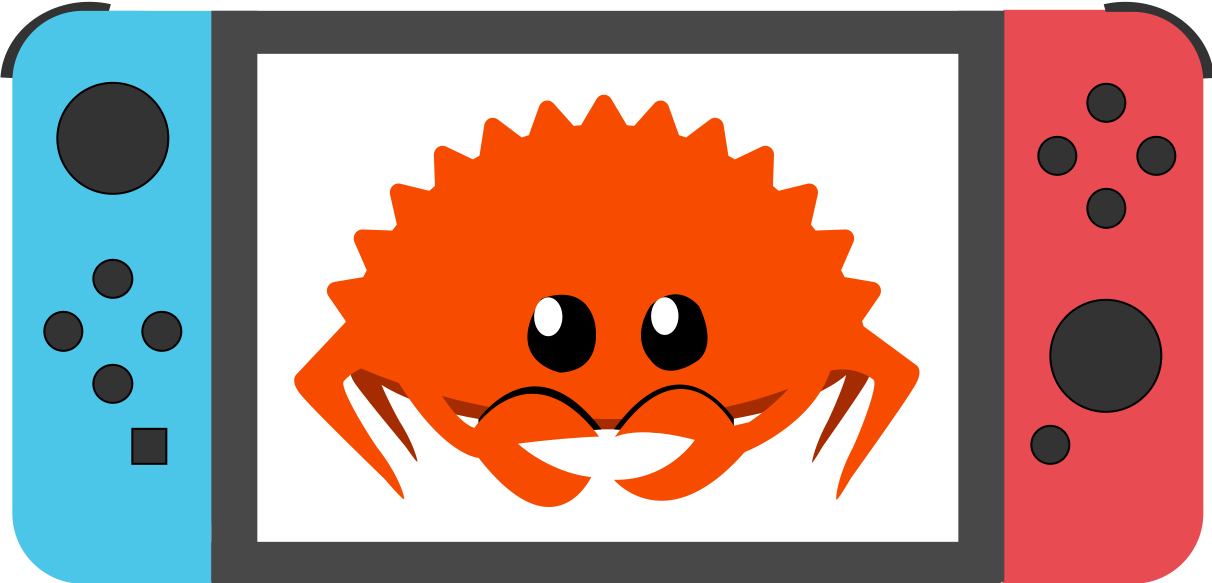joycon-rs
| Crates.io | joycon-rs |
| lib.rs | joycon-rs |
| version | 0.6.3 |
| created_at | 2020-04-16 09:31:50.415493+00 |
| updated_at | 2021-12-05 17:47:25.729353+00 |
| description | a framework for dealing with Nintendo Switch Joy-Con on Rust easily and efficiently |
| homepage | |
| repository | https://github.com/KaiseiYokoyama/joycon-rs |
| max_upload_size | |
| id | 230724 |
| size | 178,504 |
documentation
README

Joycon-rs
Documentation| Examples| Changelog| ドキュメント
A framework for dealing with Nintendo Switch Joy-Con on Rust easily and efficiently via Bluetooth.
Joycon-rs provides utility to find communicate with, and operate Joy-Con.
Please see the documentation comments for detailed instructions on how to use it.
Joycon-rs is in development and is still incomplete. Please be aware the update will include breaking changes for the time being. Pardon out dust!
Setup
On macOS or Windows, there are no preparation.
On linux,
$ sudo apt-get install libudev-dev libusb-1.0-0-dev libfox-1.6-dev
Usage
First, add dependency to Cargo.toml
[dependencies]
joycon_rs = "*"
Then, use prelude on .rs file.
use joycon_rs::prelude::*;
Perfect! Now you have Joycon-rs available in code.
Receive reports
For starters, let's take a simple signal from JoyCon.
If you use more than one JoyCon, mspc can be very helpful.
use joycon_rs::prelude::*;
let (tx, rx) = std::sync::mpsc::channel();
let _output = std::thread::spawn(move || {
// Push buttons or tilt the stick please.
// Stop with `Cmd + C` or `Ctrl + C`
while let Ok(message) = rx.recv() {
dbg!(message);
}
});
let manager = JoyConManager::get_instance();
let (managed_devices, new_devices) = {
let lock = manager.lock();
match lock {
Ok(m) => (m.managed_devices(),m.new_devices()),
Err(_) => unreachable!()
}
};
managed_devices.into_iter()
.chain(new_devices)
.flat_map(|dev| SimpleJoyConDriver::new(&dev))
.try_for_each::<_, JoyConResult<()>>(|driver| {
// Change JoyCon to Simple hid mode.
let simple_hid_mode = SimpleHIDMode::new(driver)?;
let tx = tx.clone();
// Spawn thread
std::thread::spawn( move || {
loop {
// Forward the report to the main thread
tx.send(simple_hid_mode.read_input_report()).unwrap();
}
});
Ok(())
})
.unwrap();
Set player lights
Then, lets deal with player lights.
use joycon_rs::prelude::{*, lights::*};
let (tx, rx) = std::sync::mpsc::channel();
let _output = std::thread::spawn(move || {
// Stop with `Cmd + C` or `Ctrl + C`
while let Ok(message) = rx.recv() {
dbg!(message);
}
});
let manager = JoyConManager::get_instance();
let (managed_devices, new_devices) = {
let lock = manager.lock();
match lock {
Ok(m) => (m.managed_devices(),m.new_devices()),
Err(_) => unreachable!()
}
};
managed_devices.into_iter()
.chain(new_devices)
.flat_map(|dev| SimpleJoyConDriver::new(&dev))
.try_for_each::<_, JoyConResult<()>>(|mut driver| {
// Set player lights
// [SL BUTTON] 📸💡📸💡 [SR BUTTON]
driver.set_player_lights(&vec![LightUp::LED1, LightUp::LED3], &vec![Flash::LED0, Flash::LED2]).unwrap();
tx.send(driver.get_player_lights()).unwrap();
Ok(())
})
.unwrap();
Rumble
use joycon_rs::prelude::*;
use std::convert::TryInto;
use std::ops::Deref;
use joycon_rs::joycon::joycon_features::JoyConFeature;
fn main() -> JoyConResult<()> {
// First, connect your Joy-Cons to your computer!
let manager = JoyConManager::get_instance();
let (managed_devices, new_devices) = {
let lock = manager.lock();
match lock {
Ok(manager) =>
(manager.managed_devices(), manager.new_devices()),
Err(_) => unreachable!(),
}
};
managed_devices.into_iter()
.chain(new_devices)
.inspect(|d| {
let lock = d.lock();
let device = match lock {
Ok(device) => device,
Err(e) => e.into_inner(),
};
let hid_device: JoyConResult<&HidDevice> = device.deref().try_into();
if let Ok(hid_device) = hid_device {
println!("{:?}", hid_device.get_product_string())
}
})
.try_for_each::<_, JoyConResult<()>>(|d| {
let mut driver = SimpleJoyConDriver::new(&d)?;
driver.enable_feature(JoyConFeature::Vibration)?;
// let rumble = Rumble::new(80.0,0.2);
let rumble = Rumble::new(300.0,0.9);
driver.rumble((Some(rumble), Some(rumble)))?;
Ok(())
})?;
Ok(())
}
More Examples
Here.
Features
You can use Joycon-rs for...
- Manage Joy-Cons
- Connection / Disconnection / Reconnection
- Send / Receive raw packets (u8 array) to / from Joy-Con
- Receive input to Joy-Con
- Deal with LED (Player lights)
- Vibration (Rumble)
- HOME Light
- Read Joy-Con / Pro Controller color
- Read factory / user calibration data
Planning
- Receive NFC/IR data
- Deal with Pro Controller
License
Licensed under Apache License, Version 2.0 (LICENSE or http://www.apache.org/licenses/LICENSE-2.0)
Contribution
We gladly accept contributions via GitHub pull requests. If you find a bug in the library, it would be appreciated if you could report it in detail to Issues so that it can be reproduced.



